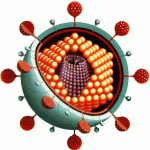Virology
|
14 august 2019 02:03:19 |
| Viruses, Vol. 11, Pages 742: Inhibitory Effects of Antiviral Drug Candidates on Canine Parvovirus in F81 cells (Viruses) |
|
Tweet Canine parvovirus (CPV) is a common etiological agent of acute enteritis, which occurs globally in domestic and wild carnivores. Despite the widespread use of inactivated or live attenuated vaccines, the emergence of antigenic variants and the influence of maternal antibodies have raised some concerns regarding the efficacy of commercial vaccines. While no specific antiviral therapy for CPV infection exists, the only treatment option for the infection is supportive therapy based on symptoms. Thus, there is an urgent medical need to develop antiviral therapeutic options to reduce the burden of CPV-related disease. In this study, a cytopathic effect (CPE)-based high-throughput screening assay was used to screen CPV inhibitors from a Food and Drug Administration (FDA)-approved drug library. After two rounds of screening, seven out of 1430 screened drugs were found to have >50% CPE inhibition. Three drugs—Nitazoxanide, Closantel Sodium, and Closantel—with higher anti-CPV effects were further evaluated in F81 cells by absolute PCR quantification and indirect immunofluorescence assay (IFA). The inhibitory effects of all three drugs were dose-dependent. Time of addition assay indicated that the drugs inhibited the early processes of the CPV replication cycle, and the inhibition effects were relatively high within 2 h postinfection. Western blot assay also showed that the three drugs had broad-spectrum antiviral activity against different subspecies of three CPV variants. In addition, antiapoptotic effects were observed within 12 h in Nitazoxanide-treated F81 cells regardless of CPV infection, while Closantel Sodium- or Closantel-treated cells had no pro- or antiapoptotic effects. In conclusion, Nitazoxanide, Closantel Sodium, and Closantel can effectively inhibit different subspecies of CPV. Since the safety profiles of FDA-approved drugs have already been extensively studied, these three drugs can potentially become specific and effective anti-CPV drugs. |
| 255 viewsCategory: Epidemiology, Virology |
 Viruses, Vol. 11, Pages 744: Isolation and Full-Length Sequence Analysis of a Pestivirus from Aborted Lamb Fetuses in Italy (Viruses) Viruses, Vol. 11, Pages 744: Isolation and Full-Length Sequence Analysis of a Pestivirus from Aborted Lamb Fetuses in Italy (Viruses)Viruses, Vol. 11, Pages 743: Serological Screening for Coronavirus Infections in Cats (Viruses) 
|
| blog comments powered by Disqus |
MyJournals.org
The latest issues of all your favorite science journals on one page
The latest issues of all your favorite science journals on one page



